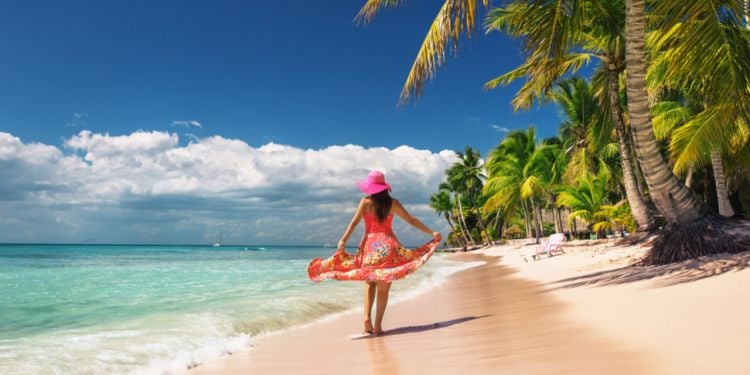
Here is some useful information on the Dominican society and lifestyle that will guide you if you are planning to move there.
Regardless of the country you come from, traveling to the Dominican Republic will undeniably be an enriching experience. In fact, you are likely to discover a society that is very different from what you are used to. It is best to get an overview of what to expect and learn about what life in the country is all about before moving there.
Your stay in the Dominican Republic is very likely to be rich in emotions and experiences, not least of which will be seeing the level of poverty, the joy and friendliness of the people, the fabulous countryside and beaches, and the warm Caribbean weather.
Climate in the Dominican Republic
Being in the tropics, the Dominican Republic enjoys an excellent climate. In the summer, the maximum temperature revolves around 32°C at noon, while the lowest is around 23°C in the morning. June, July, August, and September are known to be the hottest months. In winter, the temperature falls to 19°C at night, although, in mountainous areas such as Jarabacoa and Constanza, temperatures can even go down to 5°C. The rainy season produces some spectacular storms from May to September, but the North Coast also has a second rainy season from November to January, although not as severe.
Cuisine in the Dominican Republic
Dominican cuisine focuses on rice and is not very hot or spicy. The main herbs used are oregano and cilantro. In addition, plantain is the main vegetable and is often eaten with salami and onions. The main protein is chicken, cooked in a stew or fried. However, you can also find fast food such as burgers, pizzas, etc., across the country and several international restaurants. Vegetarians should not be disappointed either, as there is a wide variety of different vegetables – some of which you may not have heard of before!
Currency of the Dominican Republic
The Dominican peso (RD$) is the country's local currency. A peso is divided into 100 centavos. Hence, you can have 1, 5, 10, and 25 pesos coins. You are also likely to handle 2,000, 1,000, 500, 200, 100, and 50 pesos banknotes.
Exchange and ATMs
The Dominican peso is linked to the American dollar, with the exchange rate being around RD 58,61 to the dollar. Dollars are only widely accepted in tourist areas, but most prices are in pesos. Hence, you are required to exchange your foreign currency either before or when you are in the country. Exchanges can be made at Bureau de Change outlets, at banks, or at hotels. In addition, all ATMs will take foreign debit or credit cards as long as they are affiliated with Cirrus or Maestro. The money from the ATMs is always given in pesos. Credit cards are accepted in the country, but American Express is not widely accepted. As credit card fraud is not unheard of, if using a credit card, you should check your statement regularly.
Electricity in the Dominican Republic
The electricity in the Dominican Republic operates at 110 volts and 220 volts for air conditioners. The country is divided into four areas, A, B, C, and D, and each receives a different amount of electricity per day. Circuits A operate 24 hours, but the D circuits only have around 8 hours of power a day. Even A circuits do have outages for maintenance, or during or after hurricanes, so it is vital to have an inverter or generator as a backup system.
Food safety in the Dominican Republic
You are advised not to drink the tap water, and five-gallon bottles of drinking water are the alternative. Costing less than US$1, they are widely available. Fruits should be peeled before eating, and salads washed in drinking water. You should avoid eating salads outside the home unless you are sure they have been properly washed. You should also ensure that chicken and pork have been thoroughly cooked, especially if they were barbecued, and wash your hands regularly.
Language in the Dominican Republic
Spanish is the official language of the Dominican Republic, and English is not widely spoken apart from in the tourist areas. If you are planning to make a long stay in the country, you should try to learn Spanish – even a little will go a long way.
Social conventions in the Dominican Republic
Dominicans are very proud of the way they dress. Shorts and flip-flops are only meant for the beach, and they would never dream of wearing them outside the house in town. It is important to respect the local traditions, and when visiting churches, hospitals, or any government offices such as the Immigration office, you must have your shoulders covered and wear closed shoes, and men must have long trousers.
When in any business meeting, there is always some small talk that occurs before getting down to business, and you should always be courteous and polite in all situations, no matter how frustrated you might be.
Telecommunications in the Dominican Republic
There are three country codes, 809, 829, and 849, and these are preceded by the number 1 when dialing from overseas. Mobile phones are easily available, as are SIM cards for any unlocked phone purchased abroad. Internet, both fixed-line and Wi-fi, are also present throughout the country.
Routine in the Dominican Republic
Dominicans' lives seem to be perfectly balanced between work and relaxation. In fact, after a long and tiring day at work, they generally enjoy a pleasant and vibrant afternoon after office hours. Dance and music remain an essential part of the Dominican lifestyle. Lunchtime, for its part, is longer than what you are probably used to in your home country, and all Dominicans eat at noon on the dot. Many shops, especially those in tourist areas, will close at noon until around 2 pm.
Sundays are for going to the beach or river and for visiting family and friends. Bars and convenience stores are open until midnight during the week and until 2 am on Fridays and Saturdays, except during the Christmas period when the hours are extended. The drinks of choice are the local beer, Presidente, or local rum, Brugal or Barcelo, which can be mixed with Coca-Cola (a cuba libre) or Sprite (a santa libre).
The Dominican society
In general, few Dominicans get legally married, apart from those in the upper and upper middle classes, but they will live together, which is considered to be the same as marriage. Given the lack of pensions, children are expected to support their parents; hence, many have large families, although this is slowly changing. Given the fact it is a Catholic country, abortion is illegal, and there are several teen pregnancies.
Dance, party, and good humor are essential parts of the Dominican lifestyle, along with sharing everything they have. They are very welcoming to foreigners who join them in family celebrations.
Finally, it is to be noted that Dominicans have preserved the tradition of living with extended families under the same roof, especially in the countryside and in the mountains, or each part of the family will have a home on the same plot of land. It is also common for grandparents to raise their grandchildren while the parents are at work or even while the parents go overseas to work. When a couple splits up, it is usual for the woman to take care of the daughters and the man to take the sons, who are usually given to the grandparents to raise.
Cost of living in the Dominican Republic
The average salary in the Dominican Republic is around RD 14,232 pesos, which is around USD 242,83. As a foreigner, you might choose to live according to your own standards, which will need significantly more income, with the minimum being around US$1,000 a month to allow for some eating out, entertainment, and rent, along with internet and satellite television.
Religion in the Dominican Republic
Freedom of religion is a constitutional right in the country. Twenty-one percent of the Dominican population is evangelical, 48% is of Roman Catholic faith, and 28% has no religion. Hence, you will have the opportunity to experience vibrant festivals such as the Virgin de las Mercedes, which is celebrated on September 24th, and the Virgin of Altagracia, held on January 21st of each year. During Easter week, life in the Dominican Republic goes into slow motion, with most of the Dominicans leaving the cities and going to the beach with their families.
There are also several Evangelical churches and Jehovah's Witnesses.
Good to know:
Voodooism is very much present in the country due to Haitian influences; however, this practice is not very open to the public eye.
Drugs, alcohol, and smoking in the Dominican Republic
Drugs are illegal even for personal consumption or medical use (e.g., cannabis). The penalties are severe, and the jail sentences are long. Even the use of hookah in public and private places in the country is prohibited, but you are allowed to travel with your CBD oil in your carry-on luggage (not exceeding 100mL) or checked bag.
The legal drinking age in the Dominican Republic is 18 years, and they will often ask you for an ID.
Officially, you are not supposed to smoke in “closed-in” spaces, but you will see many people ignoring this rule. Outside smoking is tolerated, and you can also smoke e-cigarettes (vapes).
Useful link:
We do our best to provide accurate and up to date information. However, if you have noticed any inaccuracies in this article, please let us know in the comments section below.












Comments
1